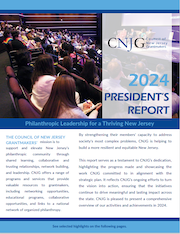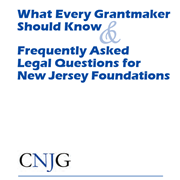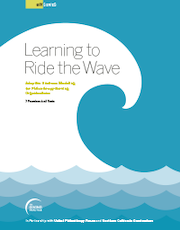Site Search
- resource provided by the Forum Network Knowledgebase.
Search Tip: Search with " " to find exact matches.
The CNJG board is comprised of 20 leaders who come from CNJG member organizations and are elected by the CNJG membership. Each board member provides guidance and leadership to CNJG by serving up to two 3-year terms.
Photo taken after CNJG Annual Meeting on December 11, 2024.
Back Row: Andy Fraizer, Christine Healey, Lucy Vandenberg, Patricia Hartpence, Aaron Turner, Craig Drinkard, Catherine Wilson, Margarethe Laurenzi, Tammy Rice Herman, and Paul DiLorenzo
Front Row: Priti Mehta, Melissa Litwin, Justin Kiczek, Kate Barrett, Theresa Jacks (CNJG), Marcy Felsenfeld, Jasmyne Beckford, and Jeremy Grunin
Not Pictured: Kortney Swanson Davis, Maisha Simmons, and Maria Spina.
CNJG Board Members
Craig Drinkard, Chair, Victoria Foundation
Justin Kiczek, 1st Vice Chair, F. M. Kirby Foundation
Christine Healey, 2nd Vice Chair, The Healey Education Foundation, Inc.
Catherine Wilson, Treasurer, United Way of Greater Newark
Kortney Swanson Davis, Secretary, Forman S. Acton Educational Foundation
Kate Barrett, The Campbell’s Foundation
Jasmyne Beckford, The Prudential Foundation
Paul DiLorenzo, Salem Health and Wellness Foundation
Marcy Felsenfeld, The Healthcare Foundation of New Jersey
Andy Fraizer, Community Foundation of South Jersey
Jeremy Grunin, Grunin Foundation
Patricia Hartpence, NJM Insurance Group
Tammy Rice Herman, New Jersey State Council on the Arts
Margarethe Laurenzi, Maher Charitable Foundation
Melissa Litwin, The Henry and Marilyn Taub Foundation
Priti Mehta, Investors Foundation
Maisha Simmons, Robert Wood Johnson Foundation
Maria Spina, PSEG Foundation
Aaron Turner, Community Foundation of New Jersey
Lucy Vandenberg, Schumann Fund for New Jersey
Theresa Jacks, President & CEO, Council of New Jersey Grantmakers – ex officio
The Board of Trustees are supported by the work of 8 different committees.
The Newark Philanthropic Liaison is a unique partnership between the Council of New Jersey Grantmakers and the City of Newark, supported by several foundations. Read more about the Liaison’s work In these reports. Due to several transitions, there were no written reports between 2015 and 2022.

CNJG's President's Reports
In 2003, with member support, CNJG commissioned a report on the impact a potential conversion of Horizon Blue Cross Blue Shield to a for-profit might have on access to health care in New Jersey. Research from the Center for State Health Policy (CSHP) at Rutgers University, provided details about the law governing such conversions in New Jersey and the experience of other states with conversions. The report identified questions raised in other states when such conversions occur, especially about the valuation of assets, the impact on low-income families, and the operation of the philanthropic foundations that have been established as stewards of the assets generated by the conversions. CNJG’s purpose was to seek answers to critical questions relevant to the availability of healthcare coverage for New Jersey’s citizens and to discuss models of best practice for healthcare conversion foundations across the United States.

This guide was designed to help the state’s philanthropic community understand their ethical, legal, and fiduciary requirements and obligations.
Foundations Facilitate Diversity, Equity, and Inclusion: Partnering with Community and Nonprofits, a new report by the OMG Center for Collaborative Learning, confirms that foundations can, in fact, facilitate diversity, equity, and inclusion (DEI) through their grantmaking processes and their partnerships with nonprofits—and identifies eight specific practices for foundations to emulate.
The report takes a deep dive into the work of nine foundations that represent a diverse cross-section of types and sizes, and offers useful lessons about how foundations can better partner with nonprofits to be more effective in their work.
We’re looking forward to seeing you at the CNJG’s 2025 Conference for the Social Sector — Stronger Together: Philanthropy & Civic Engagement on June 18! If you haven’t registered yet, please take a moment and register today for this important event. I also encourage you to invite your trustees, nonprofit partners, and colleagues to register.
Our spring Signature Convening brings together New Jersey’s philanthropic and nonprofit leaders for a day of shared learning, exchange, and community building. We’re deeply proud of the topics we’ve showcased over the years, and this year is no exception. We tackled the 2020 Census in 2019, and why it counts for the people of our state and the well-being of our communities. We uplifted the future of work and the role of philanthropy in 2021, with visionary conversations about equitable labor practices and new ways of working. The 2023 conference widely introduced Doing Good Better — a systems change initiative in partnership with the New Jersey Center for Nonprofits to reimagine how philanthropy and nonprofit partners work together.
We’ll open the day with our Spark: Civic Pulse session featuring a range of dynamic New Jersey leaders driving civic engagement across our state. The morning breakout sessions will accentuate the future of civic engagement: innovation, inclusion, and collective action; while the afternoon sessions are aimed at mobilization with civic tools, voices, and pathways to change. Our keynote speaker, Dale Anglin, Director of Press Forward, will explore and reinforce how civic engagement and democracy starts at the local level, and builds thriving, informed, and engaged communities.
This year, we’re absolutely thrilled to highlight the important issue of civic engagement and what it looks like in practice throughout our communities and across multiple disciplines. We stand in extraordinary times, and these discussions are more crucial than ever. CNJG is well positioned to elevate and amplify these conversations for, and on behalf of, New Jersey’s social sector.
I hope you’re intrigued and excited by the topic as well, and I invite you to join us as a sponsor for this very special convening of sector leaders. We have four categories of sponsorship available:
- Champion Sponsor - $8,000 – 2 available
- Collaborator Sponsor - $6,000 – 3 Available
- Connector Sponsor - $5,000 - 3 Available
- Colleague Sponsor - $3,000 – 2 available
Click here for the full sponsorship package.
Please feel free to reach out to me or my colleague, Development Associate Fortunata Cuomo via e-mail if you have questions or want to learn more about how you can support this exceptional gathering. We can also customize a sponsorship package for you, and if you’re not able to sponsor, we hope you can underwrite the event with a contribution.
Thank you to our sponsors to date: PSEG, Sixers Youth Foundation, Robert Wood Johnson Foundation, Kearny Bank, the Stone Foundation for New Jersey, PKF O’Connor Davies, and The Palace at Somerset Park. Thank you also to NJM Insurance Group for a donation in support of the event.
Your support makes all the difference.
Warmly,
Theresa Jacks, President and CEO
Council of New Jersey Grantmakers

FAQs for Benefit Survey
What is the New Jersey Foundation Benefits & Salary Summary Report?
Developed exclusively for CNJG members, the New Jersey Foundation Benefits & Salary Summary Report presents comprehensive benefits data specific to New Jersey's grantmaking community, alongside data from the Council on Foundations' annual salary survey. The last report, produced in 2017, can be found on our website.
Given increased scrutiny in the areas of compensation and benefits, the need to benchmark this information within the field has become even more important. The 2020 New Jersey Foundation Benefits & Salary Summary Report will make available critical information needed to determine fair compensation and benefits in the state across multiple organizational levels.
Who is eligible to participate in this survey?
To be eligible to participate in the survey, your organization must have at least one PAID (full-time or part-time) employee. The beginning of the survey will help respondents determine if they are eligible to participate. Even if you are NOT eligible to participate, please complete the first four questions of the survey. You will then be directed to the last page of the survey where you will be asked to submit your data. You do not need to be a CNJG member to participate. If you do participate, but are not a CNJG member, you will receive a copy of the report.
Where do I complete the survey?
The survey may be completed here: https://www.surveymonkey.com/r/2020CNJGBenefitsSurvey.
When does the survey need to be completed?
The deadline for submitting completed surveys is August 10, 2020.
I'm not the right person to complete this survey, can I email it to someone else to complete?
You may forward the email that contains the survey link to someone else in your organization. The recipient will be able to click on the survey link to access the survey.
How long will it take to complete the survey?
It is estimated that entering in the data should take around one hour (not including the time it will take to research your organization’s information). If you offer more benefits, it may take more time; if you offer less, the less time it will take to complete. Logic is built into the online survey, enabling you to skip questions or entire sections depending on what your organization offers. CNJG suggests looking through the questions first (available in PDF form) and compiling your answers to then enter in the data all at once online.
How do I submit our information to the survey?
CNJG developed the survey using SurveyMonkey, so that you may enter all of your data online. The prompts at the bottom of each page guide you as you enter your information.
Can I see all of the questions first?
Yes! The survey in its entirety can be found below. Feel free to use this document to gather your benefits data, and then enter the information all at once online at https://www.surveymonkey.com/r/2020CNJGBenefitsSurvey.
For which year/time period should I provide compensation and benefits data?
The Benefits Survey should be based on benefits data for the 2020 calendar year. Please complete the survey questions by indicating the benefits that your organization is currently offering to employees in 2020.
Help! The way that this question is structured is difficult (or impossible) for me to answer.
We understand organizations provide different kinds of benefits and have developed novel benefit packages. And, often, benefit packages differ within an organization. Please complete the survey questions by indicating the benefits that are offered to the majority of employees in your organization, and please use the comment boxes after some of the questions and at the end of the survey to further explain/clarify your responses. Please also note that, while many questions are required (indicated with an asterisk) some questions in the survey are optional and can be skipped.
Once I've started the survey, can I save it and complete it another time?
Yes! You may leave the survey at any time by clicking on "Exit this survey" on the upper right hand corner of the page. Note: if you have just entered a page of data, proceed to the next page before you exit, otherwise the data just entered for the current page will not be saved. To reopen the survey, click on the link in the survey email that was sent to you.
Once I've completed the survey, how do I submit my input?
To submit your input, go to the last page of the survey and click on "Submit Survey." Your input will automatically be submitted.
I clicked on "Submit Survey," but I wasn't finished completing the survey - what should I do?
To make changes in a survey that has already been submitted, please contact Craig Weinrich. It will be possible for you to make changes to your survey input until the survey is officially closed on August 10, 2020.
What topics will be covered?
The following topics will be covered in the survey:
• Survey Eligibility
• Organization Information
• Employment
• Leave Benefits
• Insurance Benefits
• Retirement
• Other Benefits
• Retiree Benefits
• Benefits Cost
Who do I contact if I have questions?
Should you have any questions or need additional information, please contact Craig Weinrich.
CNJG thanks you in advance for your time and assistance with this endeavor. The report that we create becomes an important tool for you to benchmark your salaries and benefits plans for the coming years, so the time and effort will be incredibly valuable to your organization and other CNJG members.
Learn how to support a disability-inclusive COVID-19 response.
COVID-19 disproportionately threatens the physical, financial, and emotional health of people with disabilities. Individuals with pre-existing health issues are at greater risk of contracting the coronavirus, many in the disability community still lack access to healthcare, and -- according to the National Trends in Disability report from the Kessler Foundation and University of New Hampshire’s Institute on Disability -- nearly one million working-age people with disabilities lost their jobs.
In this webinar, we’ll hear from Elaine E. Katz, MS, CCC/SLP, Senior Vice President Grants and Communication at the Kessler Foundation and Audrey Winkler, Executive Director of JESPY House.
Speakers will explore:
· Unique challenges facing people with disabilities during COVID-19.
· How philanthropy can support workforce opportunities for people with disabilities.
· Efforts to address ableism and create more inclusive policies and practices, on a national and local level.
For a truly equitable recovery that centers the experience of people facing multiple forms of systemic discrimination, we must address the ableism embedded in our systems, institutions, and culture. Join us for this important conversation on how your organization can address ableism in your fight for social justice, and support a more disability-inclusive response to COVID-19.
Cost: Free for CNJG Grantmakers. $50 for Non Member Grantmakers
Webinar Video
General Operating Support or General Project Support
Affirmation: Funds with the least restrictions are the most valuable
Nonprofits maintain and strengthen their organizations when their funds are unrestricted. Data shows flexible and reliable funding increases impact when nonprofit leaders have control over how funds flow to meet the needs of their constituents and internal operations, as demonstrated during the pandemic when funders released previously restricted funding. General operating support (GOS) funding signals trust in our partners and can open more honest dialogue about meeting the mutual goals of the funder and nonprofit. Funders who make project or program grants should trust the organization and provide flexible funding within a specific program.
Activities
• Over the short term, funders aim to shift their GOS activity by 30%. (30% more grants shift from program to GOS, or from fully restricted to negotiated GOS.)
• Provide grants as unrestricted organizational general operating support. The long-term ideal is for most, if not all, grants to be 100% GOS, unless a funder is legally precluded from doing otherwise.
• For project/program grants, 100% of the grant awarded is unrestricted (negotiated GOS), applying mission-based and mutually negotiated outcomes.
• Nonprofits articulate their organizational vision, strategies and intended outcomes to funders; funders understand the models of their grantee partners and learn from them how the grantee partner's work will lead to change.
• Trust nonprofit partners to know how to best apply their funding.
• Create a shared understanding of the meaning and importance of full-cost budgeting and real-cost funding.
Short-term Outcomes
• 70% of funders are shifting some of their distribution to making general operating support grants.
• 100% of program/project grants are designated unrestricted.
Long-term Outcomes
• 100% of all grants are made without restrictions, unless limited by covenant or donor wishes in the case of community foundations.
• All nonprofits can clearly articulate their vision, strategies, outcomes, and business models to funders; and funders understand them and trust them to know how best to use their funds.
How to Begin Doing Good Better on Flexibility Learning Opportunities
• Why aren’t some funders planning to award GOS or negotiate GOS?
• Ask funders: If you participated in CNJG’s 2022 funder survey and indicated that you planned to initiate GOS, have you done so? • Why are some grants restricted?
• What would it take for funders to change?
Pre-Work
• Seek and share learning opportunities for funders, prioritizing education of foundation boards, to address the barriers to awarding GOS and understand how restricted funding undermines financial sustainability.
• For funders who already regularly provide GOS funding, educate/advocate for others to do the same.
• Learn how GOS/negotiated GOS strengthens grantee partners and the multiple ways they can use and evaluate GOS. Actively seek insights from nonprofits to reinforce the message about GOS in their funding partnerships.
• As an incremental step for funders that are not receptive to GOS, provide education about negotiated general programming support (flexible funding within a mutually agreed-upon program area, as opposed to organization-wide GOS).
• Share promising practices on evaluation of GOS and negotiated GO
From the Commonfund, these white papers on investment policy statements, spending policy, board governance and risk tolerance, together with their most recent studies of investments at private and community foundations, operating charities and nonprofit healthcare organizations are made available though CNJG's Investment Forum for Foundations and Endowments.
CNJG's Storify content from their Signature Events.



